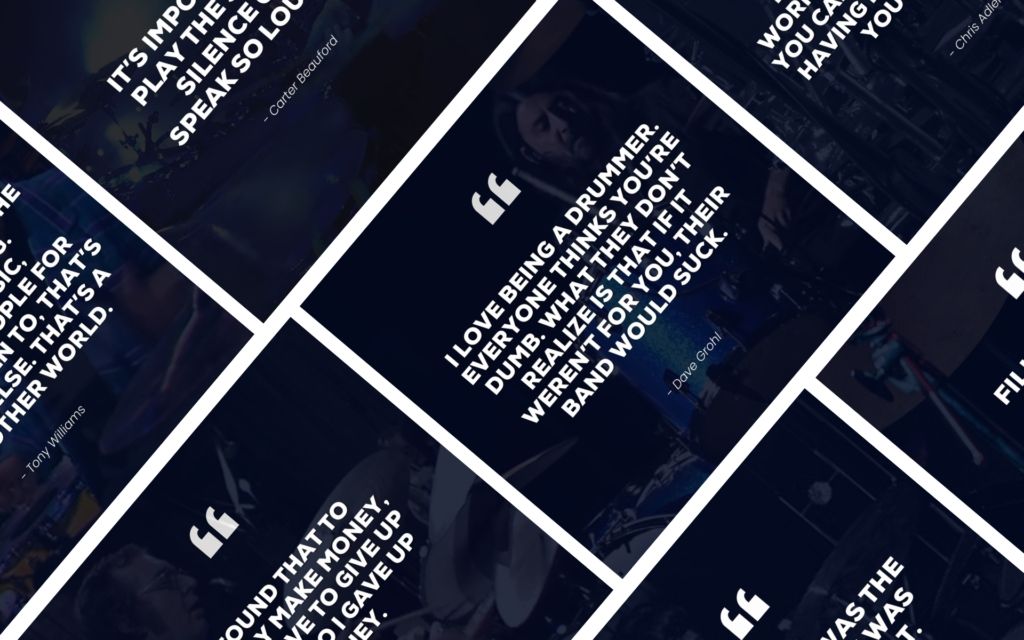No matter how fantastic a drummer you may be, you will undoubtedly struggle to get anywhere in the music industry without the help of others.
Whether you are an aspiring session player, auditioning for a band or meeting with industry professionals like agents and managers- it’s important to remember the objective of networking is to build mutually beneficial relationships.
These are my top 10 networking tips for drummers that I can offer to help you achieve the best success from music industry networking.
Contents
1. Relax and Be Yourself
Approach networking events and interactions with a relaxed mindset. Be yourself, be friendly, and enjoy connecting with others in the music industry.
There is no need to create a lot of pressure in social situations- no matter how ‘important’ someone may appear- he or she is just a normal person and will most likely be friendly and engaging in conversation.
If you are positive and exuding good energy then the chances are you will hold a natural and relaxed conversation. Personality is key, and professionals will always want to work with people they like.
2. Understand Your Value
Recognize your unique skills, experience, and contributions as a drummer. Have a clear understanding of what you bring to the table when networking with others.
Know exactly what particular skills you possess which will enable you to fulfil a role, and more importantly, give you an edge over the competition.
If you know what you have to offer is valuable then you can be confident in yourself when promoting your services.
3. Come Prepared
Before attending networking events, make sure you have a professional portfolio, business cards, and online presence (such as a website or social media profiles) that showcase your skills and accomplishments.
Do your research beforehand and make sure you know your facts. Learn about the group or organisation you hope to be working with because it will arouse interest and show you are passionate.
Unfortunately, failing to possess a professional looking social media portfolio that highlights your skills may make you appear amateur.
4. Be Patient
Building meaningful connections takes time. Don’t expect instant results. Invest in building genuine relationships and nurture them over time.
It’s important to remember that people are busy and won’t always find the time to reply straight away to emails or send over information promptly on time.
Chasing up an email is fine, but wait a week before hounding down a person and giving them grief. This may give off an impression that you are desperate and potentially scare someone off.
5. Don’t Bad Mouth
Refrain from speaking negatively about other musicians or industry professionals. Maintain a positive and respectful attitude in all networking interactions.
This may seem obvious. But before you jokingly criticise a band or musician’s performance to a person in conversation, be aware this person may unknowingly hold some significance towards them.
Offending the person you are trying to build rapport with is one way to sure-fire ruin your chances of obtaining work. The music industry is a surprisingly close-knit circle, and words you say may come back to bite you in the future.
6. Be on Time
Punctuality reflects professionalism. Whether it’s attending an event or meeting someone for a coffee, arriving on time shows respect for others’ time and makes a positive impression.
If you arrange to meet someone at a certain time, allow yourself plenty of time to be there. People will be much more inclined to help you if they know you are reliable and trustworthy.
It’s straightforward. Set alarms, reminders and use a calendar to stay organised with events and meetings.
7. Learn to Accept Rejection
Sadly it may be the case that your perfect opportunity falls through. This is life. It will be painful to read a rejection email from an agent or discover you didn’t get the call back for a gig.
What is important and beneficial will be to see this from a different perspective- that it was not meant to be. Don’t take this personally, and refrain from saying anything hurtful or bitter in response. It may be the case you encounter with this very person or company in the future!
8. Go The Extra Mile
Making a special effort to achieve your goals will not go unnoticed. Understand what it is you may be able to do that will help you get a leg up on the competition.
For example, if you have been requested to submit an online audition for a band, make sure to obtain the best quality content as possible. Use a professional studio and get it mixed to sound great in order to increase your chances of winning the audition.
9. Give Before Asking Favours
It’s important to remember that nobody owes you anything. Respect and trust is earned, and good relationships are built over time.
What you can do is show your value and demonstrate what you can offer to a potential contact so that you can benefit them. Once you have proven yourself as being valuable and trust has been earned, you can both benefit from a mutually advantageous relationship.
10. Attend Other Industry Events
In addition to attending gigs and drum-specific events, it’s beneficial for drummers to expand their network by attending broader music industry events.
These gatherings include conferences, workshops, festivals, and showcases that bring together professionals from various areas of the music business. By participating in these events, you open yourself up to opportunities to connect with producers, managers, A&R representatives, and musicians from different genres.
Building relationships with individuals outside of your immediate circle can lead to exciting collaborations, exposure to new perspectives, and potential career advancements.
11. Collaborate With Diverse Musicians
Working with artists from different backgrounds allows you to explore diverse musical styles, experiment with new sounds, and develop your versatility as a drummer.
Collaborative projects not only help you expand your network but also enable you to learn from different musical perspectives and gain exposure to new ideas and audiences.
Be open-minded and willing to step out of your comfort zone when interacting with other musicians. Embrace the opportunity to learn from their unique perspectives, share ideas, and contribute your own musical expertise.
12. Always Maintain Professionalism
Maintain professionalism in your interactions, whether it’s responding to emails promptly, showing up on time for rehearsals or gigs, or delivering quality performances.
A reputation for being reliable and easy to work with can lead to referrals and recommendations within the industry.
This also includes being accountable. Take responsibility for your actions and the outcomes of your work. If mistakes occur, acknowledge them, apologize if necessary, and take steps to rectify the situation. Learn from your failures and use them as opportunities for personal and professional growth.
Being accountable demonstrates maturity, reliability, and a commitment to delivering high-quality results.









